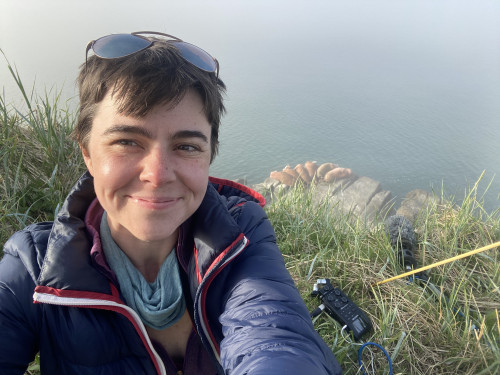Great Lakes climate reporter to visit campus as fall Science Journalist in Residence
From collecting audio of walruses in Alaska to covering avian influenza in northern Michigan, Isabelle “Izzy” Ross has a passion for making climate issues relevant to local communities. Now, as a reporter for the online magazine Grist and Interlochen Public Radio in Michigan, she tells stories of how the Great Lakes are affected by climate change. Ross will share her approach to regional environmental coverage with the University of Wisconsin–Madison community as this fall’s Sharon Dunwoody Science Journalist in Residence.
From Oct. 14 to 16, Ross will be on campus to engage with students, meet with researchers and participate in a public talk during the Wisconsin Science Festival.

Izzy Ross
Ross will join other science communicators and researchers in the festival’s flash talk event, “Big Ideas for Busy People: Fields of Wonder,” from 7 to 9 p.m. on Oct. 15 at the Majestic Theater in Madison.
By sharing stories behind her reporting, Ross will discuss how she localizes climate issues for her audiences, reveals the effects of climate change in people’s own backyards, and applies a critical lens to proposed solutions. The event is free and open to the public; doors open at 6:30 p.m.
Prior to joining Grist and Interlochen Public Radio, Ross was a reporter and news director for Alaska radio station KDLG. She has covered an array of climate topics during her career, including Alaskan fisheries, clean energy, community composting, and the recent outbreak of avian influenza in Michigan dairies.
The UW–Madison Science Journalist in Residence program was founded in 1986 and is hosted by the School of Journalism and Mass Communication and the Office of Strategic Communication. It is now part of the Sharon Dunwoody Journalist in Residence program at UW–Madison. The late Dunwoody, a professor of journalism at UW–Madison, co-founded the Science Journalist in Residence program with Terry Devitt, an emeritus director of research communications.
The program has hosted national science writers nearly every semester, in person and virtually, including PBS Eons host Kallie Moore, author and reporter Ben Goldfarb, Radiolab host Latif Nasser, Scientific American editor-in-chief Laura Helmuth, and Atlantic reporter and Pulitzer Prize winner Ed Yong.




